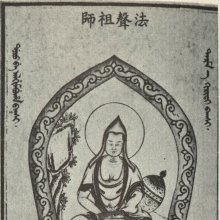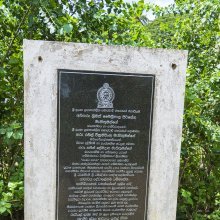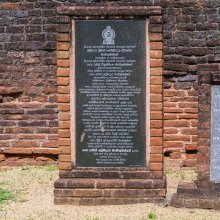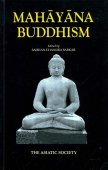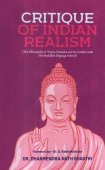Dharmakirti, Dharmakīrti: 8 definitions
Introduction:
Dharmakirti means something in Buddhism, Pali, Hinduism, Sanskrit. If you want to know the exact meaning, history, etymology or English translation of this term then check out the descriptions on this page. Add your comment or reference to a book if you want to contribute to this summary article.
Images (photo gallery)
In Buddhism
General definition (in Buddhism)
Source: WikiPedia: BuddhismDharmakīrti (ca. 7th century) also known as Serlingpa Dharmakīrti or Suvarnadvipi Dharmakīrti, was a Buddhist scholar of Srivijayan origin, Suvarnadvipa (Sumatra). He was one of the Buddhist founders of Indian philosophical logic. He was one of the primary theorists of Buddhist atomism, according to which the only items considered to exist are momentary states of consciousness.
His work: The Seven Treatises on Valid Cognition:
- Saṃbandhaparikṣāvrtti (Analysis of Relations)
- Pramāṇaviniścaya (Ascertainment of Valid Cognition)
- Pramāṇavārttikakārika (Commentary on Dignaga's 'Compendium of Valid Cognition')
- Nyāyabinduprakaraṇa (Drop of Reasoning)
- Hetubindunāmaprakaraṇa (Drop of Reasons)
- Saṃtānāntarasiddhināmaprakaraṇa (Proof of Others' Continuums)
- Vādanyāyanāmaprakaraṇa (Reasoning for Debate)
Dharmakirti (7th Century) was born to a bramhin family in the South of India. After receiving a bramhanical education, he later became interested in the Buddhist teachings. He then travelled to Nalanda in order to receive teachings from a direct disciple of Vasubandhu. Dharmapāla was still living—Dharmakirti received ordination from him—but Dignaga had passed away. Instead he received instruction from Ishvarasena, who was Dignaga's direct disciple. Having entirely comprehended Dignaga's oeuvre, he became perhaps the greatest master of pramana and went on to compose the 'Seven Treatises on Valid Cognition'.
Dharmakirti (Skt. Dharmakīrti; Tib. ཆོས་ཀྱི་གྲགས་པ་, Chökyi Drakpa; Wyl. chos kyi grags pa)
Source: academia.edu: The Chronological History of BuddhismDharmakirti (610-520 BCE) was born in the kingdom of Chudamani in the South. He was the disciple of Dharmapala according to Tibetan sources. The same Tibetan sources also tell us that Dharmakirti was the contemporary of Tibetan King Srong-btan-gampo who married a Chinese princess Kong-Cho who came to Tibet. Dharmakirti was the nephew of Kumarila Bhatta I (618-540 BCE). During the time of Dharmakirti, Adi Sankara (569-537 BCE) defeated Buddhists in the debate.
Languages of India and abroad
Sanskrit dictionary
Source: Cologne Digital Sanskrit Dictionaries: Edgerton Buddhist Hybrid Sanskrit DictionaryDharmakīrti (धर्मकीर्ति).—(compare Pali Dhammakitti), name of a teacher: Mahāvyutpatti 3483.
Source: Cologne Digital Sanskrit Dictionaries: Aufrecht Catalogus Catalogorum1) Dharmakīrti (धर्मकीर्ति) as mentioned in Aufrecht’s Catalogus Catalogorum:—a Buddhist, wrote a Bauddhasaṃgati alamk. which is quoted in the Vasavadattā p. 235. As a philosopher he is mentioned in Khaṇḍanakhaṇḍakhādya and in Sarvadarśanasaṃgraha (Bauddhadarśana) Oxf. 247^a. Verses of his are given in Śp. p. 41, [Sūktikarṇāmṛta by Śrīdharadāsa] [Subhāshitāvali by Vallabhadeva], in Dhvanyālokalocana, Kṣemendra in Aucityavicāracarcā 11. See Ind. Stud. Xvi, 205.
2) Dharmakīrti (धर्मकीर्ति):—Dhātupratyayapañjikā [grammatical] Dhātumañjarī. Lgr. 34.
Source: Cologne Digital Sanskrit Dictionaries: Monier-Williams Sanskrit-English Dictionary1) Dharmakīrti (धर्मकीर्ति):—[=dharma-kīrti] [from dharma > dhara] m. ‘glory of the l°’, Name of a philosopher and poet, [Catalogue(s)]
2) [v.s. ...] of a grammarian, [ib.]
3) [v.s. ...] of a king, [Purāṇa]
4) [v.s. ...] Name of a teacher, [Buddhist literature]
[Sanskrit to German]
Sanskrit, also spelled संस्कृतम् (saṃskṛtam), is an ancient language of India commonly seen as the grandmother of the Indo-European language family (even English!). Closely allied with Prakrit and Pali, Sanskrit is more exhaustive in both grammar and terms and has the most extensive collection of literature in the world, greatly surpassing its sister-languages Greek and Latin.
See also (Relevant definitions)
Partial matches: Dharma, Kirti, Tarma.
Full-text (+38): Prasannapada, Dharmottariya, Dhatupratyayapanjika, Shabdikabharana, Ishvarasena, Pramanavinishcaya, Pramanavarttika, Karnakagomin, Prajnakaragupta, Bauddhasamgati, Bauddhadarshana, Pravrittivishaya, Dignaga, Taranath, Taranatha, Vasubandhu, Alamkara, Asanga, Rupavatara, Dhatumanjari.
Relevant text
Search found 31 books and stories containing Dharmakirti, Dharmakīrti, Dharma-kirti, Dharma-kīrti; (plurals include: Dharmakirtis, Dharmakīrtis, kirtis, kīrtis). You can also click to the full overview containing English textual excerpts. Below are direct links for the most relevant articles:
A comparative study between Buddhism and Nyaya (by Roberta Pamio)
Review of Literature < [Introduction]
5.3. Dharmakīrti’s Definition of Perception < [Chapter 3 - The Buddhist Theory of Perception]
4. Ācārya Dharmakīrti and His Works < [Chapter 3 - The Buddhist Theory of Perception]
Reverberations of Dharmakirti’s Philosophy (by Birgit Kellner)
Closing a Gap in the Interpretation of Dharmakīrti’s Logic
Opening Speech by Shōryū Katsura
Stupas in Orissa (Study) (by Meenakshi Chauley)
During the Sailodbhavas < [Chapter 2]
The validity of Anumana (inference) in Nyaya system (by Babu C. D)
Nirvikalpaka Pratyaksha (study) (by Sujit Roy)
Related products
